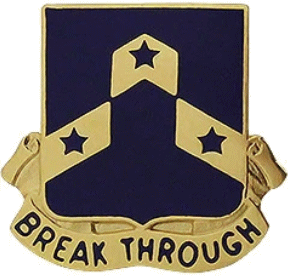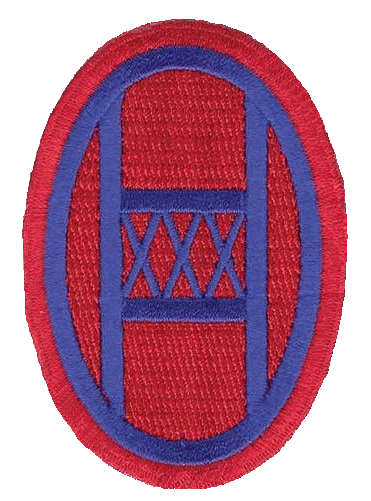


3rd Battalion - K Company
30th Infantry Division



Order of Battle for 30th Infantry Division
The 30th “Old Hickory” Division was inducted into federal service on 16 September 1940, at Fort Jackson, South Carolina. At the time of its activation the National Guard division was organized in a World War I-era “square” configuration consisting of two infantry brigades, the 59th and the 60th Infantry Brigades, and the 55th Field Artillery Brigade. Each Infantry brigade consisted of two infantry regiments, the 118th and the 121st Infantry Regiments, and the 117th and 120th Infantry Regiments, respectively.
On 22 November 1941, prior to its reorganization as a “triangular” division, the 121st Infantry Regiment was relieved from the assignment to the division. On 16 February 1942, the division’s designation changed from the 30th Division to the 30th Infantry Division. Six months later, on 24 August 1942, the 118th Infantry Regiment was relieved from its assignment to the division. A week later, on 1 September 1942, the 119th Infantry Regiment was assigned to the division. Thus, by late 1942 the division had been reorganized into a “triangular” division built around just three infantry regiments, the 117th, the 119th and the 120th Infantry Regiments. In 1942 a typical infantry regiment consisted of a headquarters and band, a headquarters company, a service company, an anti-tank company, a cannon company, and three infantry battalions.
In March 1943 the basic infantry regiment was reorganized to include a headquarters, a headquarters company, a service company, an anti-tank company, and three infantry battalions. Each of the three infantry battalions consisted of a headquarters and headquarters company, three rifle companies and a heavy weapons company. Within each regiment, the 1st Battalion consisted of Companies A through D, the 2nd Battalion consisted of Companies E through H, and the 3rd Battalion consisted of Companies I through M (there was no Company J).
Following service in the European Theater of Operations, the division was inactivated on 24 August 1945, at Fort Jackson, South Carolina.
An "Order of Battle" for an armed force participating in a military operation or campaign shows the hierarchical organization, command structure, strength, disposition of personnel, and equipment of units and formations of the armed force. The "Order of Battle" (or "ORBAT") for the U.S. Army participating in the European Theater of Operation in World War II showed the hierarchical organization, command structure, strength, disposition of personnel, and equipment of units and formations within the 30th Infantry Division. During the war, this information was kept highly secret. As combat operations develop during a campaign, orders of battle were revised and altered in response to the military needs and challenges. The Order of Battle changed depending on requirements as the battle as it was being fought and as units were reassigned or replaced. The Commanding Officers reflected these changes in their "after action" reports (dispatches). After the war, the 30th Infantry Division's "Order of Battle" during the different phases of the war became a part of the units history and were no longer considered classified information.
The following table shows a simplified version of the Order of Battle for the 30th Infantry Division.
Order of Battle for the 30th Infantry Division
|
· Headquarters, 30th Infantry Division · 117th Infantry Regiment o 1st Battalion (Companies A-D) o 2nd Battalion (Companies E-H) o 3rd Battalion (Companies I-M) · 119th Infantry Regiment o 1st Battalion (Companies A-D) o 2nd Battalion (Companies E-H) o 3rd Battalion (Companies I-M) · 120th Infantry Regiment o 1st Battalion (Companies A-D) o 2nd Battalion (Companies E-H) o 3rd Battalion (Companies I-M) · Headquarters and Headquarters Battery, DIVARTY o 113th Field Artillery Battalion (155 mm) o 119th Field Artillery Battalion (105 mm) o 197th Field Artillery Battalion (105 mm) o 230th Field Artillery Battalion (105 mm) · 105th Engineer Combat Battalion · 105th Medical Battalion · 30th Cavalry Reconnaissance Troop (Mechanized) · Headquarters, Special Troops, 30th Infantry Division o Headquarters Company, 30th Infantry Division o 730th Ordnance Light Maintenance Company o 30th Quartermaster Company o 30th Signal Company o Military Police Platoon o Band · 30th Counterintelligence Corps Detachment
For more details see: U.S. Army Center of Military History |
Typical World War II U.S. Army Typical Unit Sizes (Including the 30th Division)
| Unit | Sub-Units | No. of Soldiers | Command | Support Units |
| Squad | - | 7 - 14 | Sergeant | - |
| Platoon | 3 - 4 Squads | 20 - 50 | Second Lieutenant | - |
| Company | 3 - 4 Platoons | 100 - 250 | First Lieutenant or Captain or Major | Platoon in charge of supply, maintenance, etc. |
| Battalion | 3 - 4 Companies | 400 - 1,200 | Lieutenant Colonel | Battalion Headquarters (Staff Officers in charge of personnel, operations, intelligence, and logistics) |
| Regiment or Brigade | 3 - 4 Battalions | 2,000 - 8,000 | Colonel or Brigadier General | Regiment Headquarters (Armor, Artillery, and Reconnaissance units) |
| Division | 3- 4 Regiments | 7,000 - 22,000 | Major General | Division Headquarters (HQ Company, Ordnance Light Maintenance Company, Quartermaster Company, Signal Company, Military Police Platoon, Band |
30th Infantry Division World War II European Theater Assignments to Higher Units
| Date | Assignment |
| 18 February 1944 | XIX Corps, First Army |
| 15 July 1944 | VII Corps, First Army, 12th Army Group |
| 28 July 1944 | XIX Corps, First Army, 12th Army Group |
| 1 August 1944 | XIX Corps, First Army, 12th Army Group |
| 4 August 1944 | V Corps, First Army, 12th Army Group |
| 5 August 1944 | VII Corps, First Army, 12th Army Group |
| 13 August 1944 | XIX Corps, First Army, 12th Army Group |
| 26 August 1944 | XV Corps, Third Army, 12th Army Group, but attached to First Army |
| 29 August 1944 | XIX Corps, First Army, 12th Army Group |
| 22 October 1944 | Ninth Army, 12th Army Group |
| 17 December 1944 | Ninth Army, 12th Army Group, but attached to V Corps, First Army, 12th Army Group |
| 22 December 1944 | XVIII Airborne Corps, and attached, with the First Army, to the British 21st Army Group |
| 18 January 1945 | XVIII Airborne Corps, First Army, 12th Army Group |
| 3 February 1945 | XIX Corps, Ninth Army, 12th Army Group |
| 6 March 1945 | XVI Corps, Ninth Army, 12th Army Group |
| 30 March 1945 | XIX Corps, Ninth Army, 12th Army Group |
| 8 May 1945 | XIII Corps, Ninth, 12th Army Group |
Additional Pages (Click Below)
© Copyrighted 2007 by Darrel R Hagberg. All rights reserved.
Moline, Illinois U.S.A.
June 12, 2024
Contact darrelrhagberg@gmail.com for more information